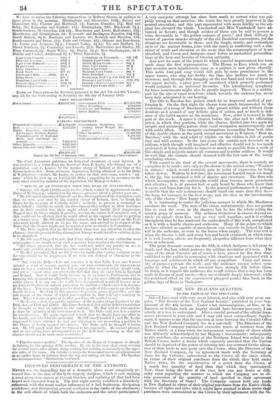The Cork Examiner publishes an historical document of some interest.
It was enclosed in a letter from the Reverend John P. Leahy, who formed one of a deputation sent to London by the regular clergy of Ireland at the time of the Emancipation Act. Some erroneous impression having obtained as to the Duke of Wellington's conduct, Mr. Leahy, in justice to that statesman, sends a " mi- nute" which he drew up on leaving the Duke ; appealing for its accuracy to the only other surviving member of the deputation, the Bishop of Saldes.
"MINUTE OF AN ENTER-VIEW WITH THE DUKE OF WELLINGTON.
" Sunday, 5th April (1829).—At twelve o'clock, waited by appointment on the Duke of Wellington; admitted to his Grace's presence about a quarter past one. "Mr. O'Connell introduced himself and the other members of the deputation: said that we were sent over by the regular clergy of Ireland, first, to thank his Grace for the measure of Catholic relief ; secondly, to present a memorial on their behalf ; thirdly, to satisfy the Government that neither in their institutes nor in their conduct was there aught which could justify their suppression. Begged that his Grace might, if possible, rescind the clause in Committee, and, if this could not be effected, that he would afford us his support should we petition at a future time. Mr. O'Connell further stated, that he had waited on Mr. Peel; who most kindly allowed us to itse his name, and advised us to request of the Duke that the clauses might not be rendered more restrictive in Committee.
" The Duke replied, that he did not think there was any intention to alter the clauses; that the present feeling throughout Europe would not allow existing rights to be disturbed.
" Mr. O'Connell begged to add, that if any thing short of our extinction were contemplated, we should not at such a moment have troubled the Government.
" His Grace answered, that the law would not inflict any penalty on us; it would only prohibit others from hereafter entering into such societies.
" Mr. Ray remarked, that we felt it was by implication casting a stigma on us; for why should we be suppressed if we were not disloyal or obnoxious to the state?
" No,' said the Duke; I do not consider it in that light. I am sure I never uttered a word of censure against yOtl; ON THE CONTRARY, MY PREJUDICES ARE IN YOUR FAVOUR: but the law required that no such orders should exist, and vet we cannot close our eyes to the fact that they do exist botli in England and Ireland. Now it would badly become us to go down to Parliament, and in carrying tins tremendous affidr—for you see it is a far more difficult matter than either you or I or any one else could have imagined—it would ill become us to go down to Parliament and ask protection for institutes width existed in defiance . of the laws. You may easily perceive that the people of this country are decidedly hostile to you. We wish by this measure to procure peace, ifpossiblet and the sole reason of the clause of which you complain is, that you exist contrary to law. What I desire at present is, that you leave the matter to me: " Mr. Leahy asked, was not the existence of the regular clergy legalized by the Irish Acts of 1791 and 1793? His Grace hesitated, and said he believed not—that he thought he had an opinion to the contrary. Mr. Ray said we were anxious t) draw the attention of the Government to it. The Duke said, yes, it is a matter for consideration. He again expressed a wish that we should leave our affair in his hands, and asked for the memorial. Mr. O'Connell handed it; and Mr. Leahy requested to know whether he had any objection to our presenting a petition to the House of Lords against the clauses. The Duke said he thought it better not. Mr. O'Connell said that we trusted to Ids generosity. He seemed pleased, and on our taking leave accompanied us to the hall-door; assuring us that the clauses should not be made more restrictive."


























 Previous page
Previous page